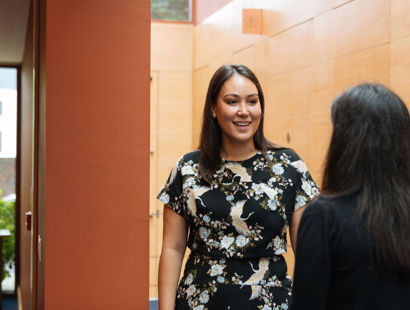
The perks of being a trainee at Russell-Cooke
Fourth-seat trainee Imogen Carr reflects on the key lessons she’s learned during her training contract so far.
Embarking on a training contract is both an exciting and challenging step in your legal career. As a trainee solicitor at Russell-Cooke, you're not just observing legal processes; you're actively contributing to them. Here are some of the key lessons I've taken away from this transformative period so far.
Proactivity
A key theme that has remained prevalent throughout my experience has been the importance of being proactive, although this can look quite different depending on whether you are working in transactional or litigious areas. For example, during my seat in private client, I was given the responsibility of managing several probate matters. This involved working to deadlines, communicating with clients, keeping the supervising partner informed, writing to third parties, and overseeing the general progress of the matter. On the other hand, working as a trainee in a litigious seat often requires a different type of proactivity. While it is less common for a trainee to manage a matter themselves, working in this area still requires significant proactivity to recognise when work is needed and what the appropriate next steps may be. The unpredictable nature of litigation often lends itself to urgent decision-making. Whether it's a surprise call from a concerned client, an antagonistic letter from the other side, or perhaps a battle with PDF Docs in the face of a fast-approaching court deadline to file a bundle - litigation requires fast thinking and a problem-solving attitude.
Overall, it is important to try and make the most of working in each department by asking questions, seeking feedback, and getting involved wherever possible.
Adaptability
Due to the very nature of the training contract — involving four different seats over two years —you are required to adapt to each new area you train in. The training contract has exposed me to a broad range of practice areas and working styles. One of the advantages of a training contract is that your day-to-day can vary dramatically and we are encouraged to volunteer for new tasks and work with all the lawyers available. Each new seat has brought a fresh set of challenges, especially experiencing the substantial shift of moving from litigation to transactional work and back again. The ability to adapt quickly to changing circumstances did not necessarily come to me with great ease at the beginning of the training contract, and the first month of each new seat always led to self-doubt about my knowledge of the law and practice area in general. Nevertheless, combining hard work along with appropriate supervision (and the occasional bonding session with my trainee cohort at The Railway pub over the road from the firm’s Putney office) has aided each transition significantly.
Responsibility
A striking aspect of the training contract at my firm is the level of responsibility entrusted to trainees from the outset. As I have mentioned above, even in the early stages, trainees are often given direct client contact, encouraged to manage their own caseloads, and are involved in significant aspects of legal matters.
I have had many valuable experiences throughout the training contract, but several moments stand out in particular. Very recently, I was given the opportunity to attend a final hearing for a high-net-worth divorce case in the High Court. In addition, I attended two mediations during my first seat, which provided invaluable insights into alternative dispute resolution and the practical processes of negotiating in this forum. Having a back-stage pass (so to speak) into the negotiations and tactical discussions that go on during these processes was both informative and riveting. From attending countless client meetings, I have watched the lawyers build trust and deliver clear, commercially focused advice. This has taught me that preparation and active listening are just as important as technical knowledge. These experiences made the work feel real and underscored the human side of law.
Moreover, the responsibility extends beyond individual tasks. The high level of responsibility has other positive repercussions as trainees are encouraged to participate in business development activities, engage in marketing initiatives, and attend the many social events on offer.
Looking back
The training contract is an intense but hugely rewarding journey, laying a strong foundation for the next stage of one’s legal career. The experiences and lessons learned during this time have shaped me into a more adaptable, proactive, and responsible legal professional, ready to take on new challenges and opportunities.
Imogen Carr is currently a fourth-seat trainee in the family and children team.
Get in touch
Visit our graduate recruitment portal for further information on our training contracts and vacation scheme.




